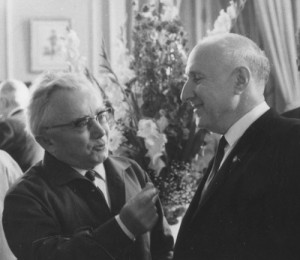In the summer of 1965 Tiomkin was awarded the Ravel medal by SACEM, the Société des Auteurs, Compositeurs et Éditeurs de Musique, known in the U.S. as “the French ASCAP.”
Tiomkin met composer Maurice Ravel in 1928, when he was in Paris to perform the European premiere of Gershwin’s Concerto in F. A week prior to the performance, Tiomkin and his wife, choreographer Albertina Rasch, hosted a reception to honor Gershwin and Ravel was among the guests.
Dimitri Tiomkin described Ravel as “a most singular character, a little, birdlike fellow” who was “the epitome of all that was elegant and aristocratic in music.”
Tiomkin was no stranger to Ravel’s work. As a student in Russia, Tiomkin studied the French composer’s music and later as a pianist performed Ravel’s Gallows (“Le Gibet” from Gaspard de la nuit), Minuet after Haydn (“Menuet sur le nom d’Haydn”), Unhappy Bird (“Sad Birds” from Oiseaux tristes), and Toccata (from Le Tombeau de Couperin) in concert. Reviewers often noted Tiomkin’s bold programming choices.
We are grateful that Monsieur Tiomkin has been bold enough to make up a new program, in which Scriabine and Tansman joined ranks with Stravinsky, Ravel, and Monsieur Tiomkin himself, of whom a composition elegantly written revealed a clever composer as well as a performer of genuine merit. [Translated from the French.] –G. Bret, L’Intransigeant, December 4, 1927.
In the spring of 1965, SACEM, the performing rights organization headquartered in Paris, decided to bestow the first ever Maurice Ravel award on Tiomkin and contacted the composer in Hollywood. Pierre F. Devaux, SACEM’s general director, wrote on May 10 to fix the date for the award presentation and reception. The following week Devaux followed up asking Tiomkin for some biographical information for the event.
At a gala soiree held on June 24 at the Hotel Crillon, situated on the Place de la Concorde at the foot of the Champs-Élysées in Paris, Tiomkin received the Maurice Ravel gold medal from SACEM’s president, Georges Auric.
Auric needs little introduction. As one of the group of six French composers dubbed Les Six, alongside Honegger, Milhaud, and Poulenc, he wrote concert music, collaborated with filmmaker Jean Cocteau on nearly a dozen films, and became widely known for his score for the 1952 film, Moulin Rouge, directed by John Huston.
Back in the 1920s when Tiomkin was living in Paris he was aware of Les Six, as he later wrote, “the leading composer of the day was Ravel, but the group of modernists, the Six, was troubling the musical world with new kinds of discord.”
Tiomkin’s piano concerts championed works by Poulenc and Milhaud, so it must have been an honor to be presented the Ravel award by a member of Les Six.
Auric read a prepared speech, presented the award to Tiomkin who said a few words, and they got on with the reception.
Among the attendees were SACEM officials, representatives of French music publishers, European delegates from performing rights organizations in Berlin and Rome, and a number of prominent composers and lyricists, including Henti Betti, French composer of the jazz standard C’est si bon; Nikita Bogoslovsky, Russian composer; Henri Contet, French lyricist, notably for Edith Piaf; Ray Ventura, French jazz band leader, and others.
Nikita Bogoslovsky, Soviet-era composer for more than 100 films.
Ray Ventura, French jazz band leader.
Charles Eustis “Chip” Bohlen, U.S. diplomat and Ambassador to France
Tiomkin became a SACEM member around 1930. A notice of the SACEM soiree in the Hollywood trade paper, Variety, noted that Tiomkin remained faithful to SACEM through more than three decades despite economic hazards that ran the gamut from currency devaluation to the difficulty of collecting royalties during World War II.
After the reception, Tiomkin sent a letter to SACEM that elicited the following response, roughly translated from the French, from Georges Auric.
[on SACEM letterhead]
Paris, 2 July 1965
Mr. Dimitri TIOMKIN
333 South Windsor Boulevard
LOS ANGELES, California 9ooo5My dear Dimitri,
The Board of Directors and our General Director, have been very affected by your charming letter of June 30.
Personally, I must tell you how pleased we are to have organized a dazzling reception at the Hotel Crillon. Indeed, advertising for this occasion certainly helps increase the prestige of our Society.
Be assured that with your attribution of the “Maurice Ravel” medal, and knowing how deserving you are, we are, therefore, satisfied that we achieved our goal.
Please accept, dear Dimitri, the expression of my most friendly feelings.
President
Georges Auric

A lively discussion by a trio of influential international composers: Georges Auric (left), Tiomkin, Nikita Bogoslovsky (right).
An article on the event was to appear in the SACEM bulletin and the organization provided Tiomkin with a photograph album commemorating the occasion, now viewable for the first time on this site, along with correspondence, below, related to the honor. View album pages, including the text of Georges Auric’s speech in French.
Sources
- “Sacem’s Soiree for Hollywood’s Tiomkin,” Variety Weekly, June 16, 1965.
- “Ravel Prize Given to Dimitri Tiomkin,” Variety, June 17, 1965.
- Please Don’t Hate Me by Dimitri Tiomkin and Prosper Buranelli (Doubleday, 1959).














